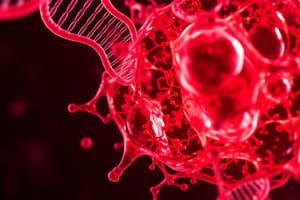Podcast
Questions and Answers
What is the primary function of the nucleus in a cell?
What is the primary function of the nucleus in a cell?
- To regulate gene expression and cell division (correct)
- To convert energy through respiration
- To produce proteins for cellular functions
- To transport materials within the cell
What does the nuclear envelope primarily protect?
What does the nuclear envelope primarily protect?
- Ribosomes during protein synthesis
- Cellular organelles from damage
- Enzymes responsible for metabolism
- DNA from damage (correct)
Which statement about the nucleus is true?
Which statement about the nucleus is true?
- It does not play a role in regulating gene expression.
- It is the main site for ATP production.
- It contains the cell's genetic material. (correct)
- It is responsible for cellular respiration.
In addition to housing genetic material, what role does the nucleus play?
In addition to housing genetic material, what role does the nucleus play?
Which of the following correctly defines the role of the nucleus?
Which of the following correctly defines the role of the nucleus?
Flashcards are hidden until you start studying
Study Notes
Nucleus Function and Importance
- Acts as the control center of the cell, directing cellular activities.
- Houses genetic material, specifically DNA, vital for inheritance and cell function.
- Responsible for regulating gene expression, influencing which genes are turned on or off.
- Plays a key role in cell division, ensuring genetic material is accurately replicated and distributed.
Nuclear Envelope
- Encloses the nucleus, providing a protective barrier for the DNA.
- Helps prevent damage to genetic material from external factors, maintaining cell integrity.
- Composed of two lipid bilayers, which control the entry and exit of materials between the nucleus and cytoplasm.
Studying That Suits You
Use AI to generate personalized quizzes and flashcards to suit your learning preferences.



